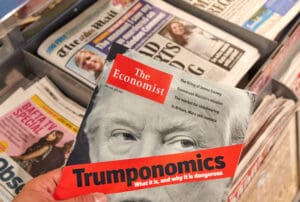Lynn Forester de Rothschild is preparing to sell her 20 per cent interest in The Economist, paving the way for the most significant change in the 182-year-old publication’s ownership since 2015.
The British-American financier, 71, has appointed investment bank Lazard to oversee the process, which remains at an early stage. The stake, made up of voting shares, could fetch as much as £400 million based on current valuations of the premium media group.
It would be the first major shake-up since Pearson sold most of its 50 per cent holding a decade ago. That move allowed Italy’s Agnelli family, through its Exor investment firm, to emerge as the magazine’s single largest shareholder, with a 43.4 per cent stake.
Forester de Rothschild, who married the late financier Sir Evelyn de Rothschild in 2000, inherited and built upon his holdings. Together they created EL Rothschild, a family office with investments spanning public companies, private firms and real estate.
Industry insiders suggest that likely buyers this time are high-net-worth individuals or family offices, as The Economist is typically viewed as a trophy asset with long-term value, rather than a vehicle for quick financial returns.
The Economist Group, which owns the weekly magazine, website, podcasts, the Economist Intelligence Unit and Economist Impact events business, employs 1,540 staff across 26 countries.
Last year, the group reported revenues of £369 million, up 3 per cent on the year before, with operating profits of £48.1 million. Subscriptions rose 3 per cent to 1.25 million, including an 8 per cent increase in digital-only customers.
The magazine’s reputation for independence and influence in global business and political circles means it attracts a loyal subscriber base and premium advertisers.
The sale will need to navigate The Economist’s unusual share structure, which is designed to preserve its editorial independence. Its equity is split into ordinary shares, “A” special shares, “B” special shares and trust shares.
The trust shares are held by independent trustees, whose mandate is to safeguard editorial freedom and approve significant corporate decisions.
Exor owns all of the “B” shares, giving it influence over board appointments, while there are more than 100 holders of “A” shares. Forester de Rothschild controls about 26.7 per cent of the total issued capital, including “A” and ordinary shares.
Critically, the rules prevent any one shareholder — or group acting in concert — from holding more than 50 per cent of the voting rights. That means her stake cannot simply be transferred to Exor or another single strategic player without trustee approval.
Forester de Rothschild has a long business pedigree, having founded US telecoms company FirstMark Communications in the late 1990s and served on the board of Estée Lauder. She has also played a prominent role in transatlantic philanthropy, including the Economist Educational Foundation.
Her decision to explore a sale is seen as part of a wider strategic review by EL Rothschild and The Eranda Foundation, which also owns shares in The Economist.
With Lazard appointed, the search for potential buyers is now under way. Any deal could reshape the balance of power at one of the world’s most influential business titles.
An Economist Group spokesperson said: “EL Rothschild and The Eranda Foundation are long-term investors, as well as generous supporters of the Economist Educational Foundation. They regularly conduct strategic assessments of their portfolio and evaluate potential opportunities. They are working constructively with the company on the eventual outcome.”
Neither Lazard nor EL Rothschild offered further comment.
If completed, the transaction would not only represent a rare chance to buy into one of the world’s most recognisable media brands but also signal the end of Lynn Forester de Rothschild’s two-decade stewardship of one of Britain’s most closely-guarded journalistic institutions.
